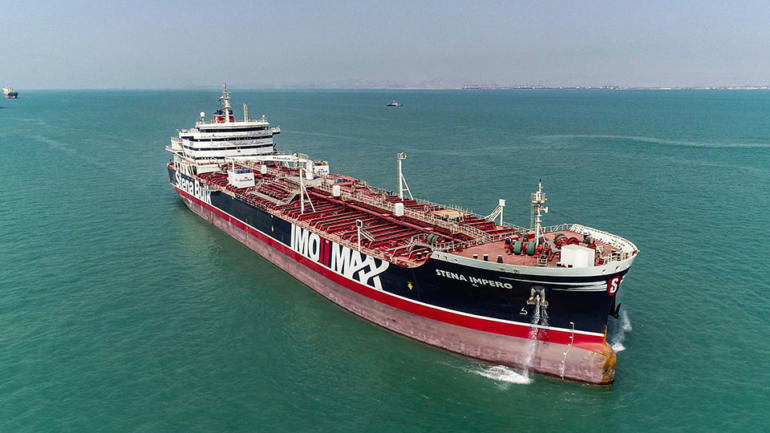Iran on Friday released a British-flagged oil tanker it had seized in July, while the country’s president, returning from an annual United Nations meeting, said he had been told the United States had offered to lift sanctions if Tehran returned to the negotiating table over its nuclear program.
The British-flagged Stena Impero left the port of Bandar Abbas on Friday morning, heading to Dubai where its crew would disembark, the vessel’s Swedish-based ship-owning company Stena Bulk said.
Iran seized the tanker on July 19 in the Strait of Hormuz, the narrow mouth of the Persian Gulf through which 20% of all oil passes. The raid saw commandos rappel down onto the vessel from a helicopter carrying assault rifles in dramatic images later replayed on state television.
The raid came after authorities in Gibraltar, a British overseas territory, seized an Iranian supertanker carrying $130 million in crude oil on suspicion it was breaking European Union sanctions by taking the oil to Syria. Gibraltar later released the tanker, then called the Grace 1, after it said Iran promised the ship wouldn’t go to Syria.
That ship, renamed the Adrian Darya 1, later sat off the Syrian coast, angering Britain. Iran hasn’t said who purchased its 2.1 million barrels of crude oil.
Britain responded to Iran’s release of the Stena Impero on Friday by accusing Tehran of trying to disrupt freedom of navigation.
U.K. Foreign Secretary Dominic Raab said the ship “was unlawfully seized by Iran” and that the action was “part of a pattern of attempts to disrupt freedom of navigation. We are working with our international partners to protect shipping and uphold the international rule of law.”
The ship seizures come after months of heightened tensions in the Persian Gulf, sparked by President Donald Trump’s decision over a year ago to unilaterally pull out of a nuclear deal with Iran. The U.S. has imposed sanctions that have kept Iran from selling its oil abroad and have crippled its economy. Iran has since begun breaking terms of the deal.
Iranian President Hassan Rouhani, returning to Tehran after attending the U.N. General Assembly meeting in New York, said Friday that U.S. sanctions were ineffective and a barrier to dialogue. “Otherwise Iran does not fear negotiation,” he said.
Rouhani said the leaders of Germany, France and Britain had told him the U.S. was prepared to lift the sanctions if Tehran agreed to negotiations on the nuclear deal.
“Germany’s chancellor, Britain’s prime minister and France’s president were there. They all insisted on a meeting. … They said America was saying it would lift the sanctions,” the president said.
But he said Iran could not accept negotiation before the sanctions were lifted.
However, Trump had a different take on events, tweeting that “Iran wanted me to lift the sanctions imposed on them in order to meet. I said, of course, NO!”
There have been a series of attacks across the Middle East that the U.S. blames on Iran. They reached their height on Sept. 14, with a missile and drone attack on the world’s largest oil processor in Saudi Arabia and an oil field, which caused oil prices to spike by the biggest percentage since the 1991 Gulf War. While Yemen’s Iranian-allied Houthi rebels claimed the assault, Saudi Arabia says it was “unquestionably sponsored by Iran.”
Iran denies being responsible and has warned any retaliatory attack targeting it will result in an “all-out war.”
<strong><em>Story by The Associated Press</em></strong>
 CGTN America
CGTN America This picture taken on September 27, 2019 shows the British-flagged oil tanker Stena Impero as it leaves Bandar Abbas port in southern Iran. (Photo by Mehdi DEHDAR / fars news / AFP)
This picture taken on September 27, 2019 shows the British-flagged oil tanker Stena Impero as it leaves Bandar Abbas port in southern Iran. (Photo by Mehdi DEHDAR / fars news / AFP)
